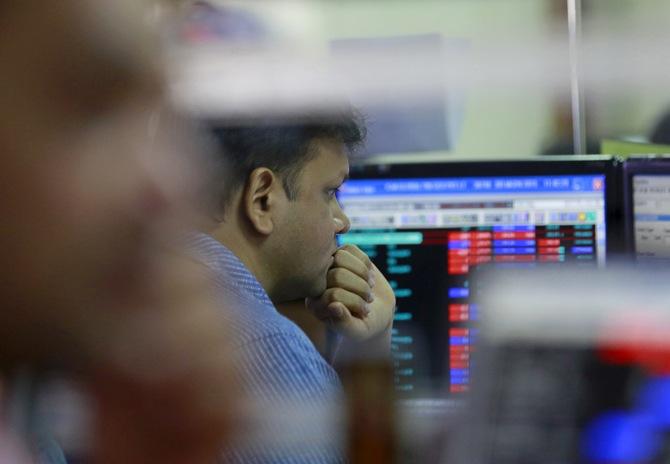This is the lowest investment grade rating, but a 'positive' outlook indicates room for further upgrade.

In a 'credit negative' for its sovereign and bank ratings, India's rural economy will remain subdued through this fiscal, while ‘some disappointment’ has emerged about pace of reforms under the Modi government, global giant Moody's said on Tuesday.
In its latest 'Inside India' report, Moody's Investors Service said the consensus view on India's economic growth prospects is relatively optimistic -- in line with Moody's baseline scenario of economic expansion of 7.5 per cent in the current fiscal.
"Forecast represents the highest projection amongst G20 economies, and provides a key pillar of support for the Baa3 sovereign rating and positive outlook," it said.
This is the lowest investment grade rating, but a 'positive' outlook indicates room for further upgrade.
However, the results of polls conducted by it last month showed ‘some disappointment. . .with regard to the pace of reform under the administration of Prime Minister Narendra Modi, and increasing concerns about the risk of policy stagnation.
"Specifically, almost half of the poll respondents

identified sluggish reform momentum as the greatest risk to India's macroeconomic story."
In the report, Moody's further said the multi-party, federal democracy in India underpins a gradual pace of policy implementation.
"While many of the policies are positive for India's institutional strength, the direct impact of growth-enhancing reforms is only likely to take full effect over a multi-year horizon."
Moody's further said it expects India's weakened rural economy to remain subdued through the fiscal year ending March 2016, particularly if the risk of below-average monsoon rainfall materialises.
"A sustained soft patch for India's rural economy would weigh on private consumption and non-performing assets in the agricultural sector, (which is) a credit negative for the sovereign and banks," Moody's vice president and senior research analyst Rahul Ghosh said.

The rural income growth in India has been stuck in the mid-to-low single digits in so far this year, well off the 20 per cent-plus rates clocked in 2011.
The slower rural income growth is partly the result of increased fiscal restraint by the central government, which Moody's believes is unlikely to change in the coming quarters.
Elaborating further on policy reforms, Moody's said the plans to cut the country's corporate tax rate to 25 per cent from the existing 30 per cent over the next four years will be ‘credit positive’ for all Indian corporates insofar as it will reduce their tax expenses and increase their competitiveness over the medium term.
Moody's further said India's pro-cyclical industries will benefit from improving credit conditions through the current fiscal, while the country's LNG import book was credit positive for companies like GAIL.
The public sector banks' credit profiles would improve only in the medium term, it added.
Citing results of polls conducted during the first annual Moody's and ICRA India Credit Conference in Mumbai last month, Moody's said almost half of the respondents believed ‘that sluggish reform momentum represents the greatest risk to India's macroeconomic story going forward’.
Moody's, however, said the recent policy changes are slowly taking effect and the positive impact of growth-enhancing reforms is only likely to take full effect over a multiyear horizon.
"Policies, including the 'Make in India' campaign, increased foreign direct investment limits in rail infrastructure, defence and insurance, and bills related to mining will all improve India's growth outlook.

"The government's recent policy agenda -- including diesel price deregulation, lifting of the iron ore mining ban, the Coal Mines Special Provisions Bill and the Mines and Minerals Development and Regulation Bill – will benefit refining, metals, steel and power companies.
"Other sectors have yet to see a specific boost from government policies under the Modi administration, but are likely to benefit from the government's pro-growth agenda," it added.
In the survey, sluggish reform momentum was cited as the greatest risk (47 per cent) to India's macroeconomic story over the next 12-18 months, followed by infrastructure constraints at the second place (38 per cent) and external shocks at the third (10 per cent).

The resurgent inflation and fiscal performance came as the fourth and fifth biggest concerns.
Asked what would be the key driver of credit conditions for Indian corporates over the next 12-18 months, respondents named government policy implementation on the top (56 per cent), followed by monetary easing at the second place (23 per cent), while commodity price weakness and external factors came in at the third and fourth places.
Meanwhile, the project approval delays emerged as the biggest challenge for the infrastructure sector, followed by lack of available funding, weak financial health of the sector and loss of reform momentum as other main concerns.
Moreover, a newly installed inflation-fighting framework, regulatory simplification and government expenditure management reforms are all positive for India’s institutional strength, it added.
On Indian banks, the survey noted that the ‘trough’ is yet to be seen in the asset quality cycle and "banks will continue to wrestle with weak asset quality in the coming 12 to 18 months, which will act as a constraint on overall economic growth".








